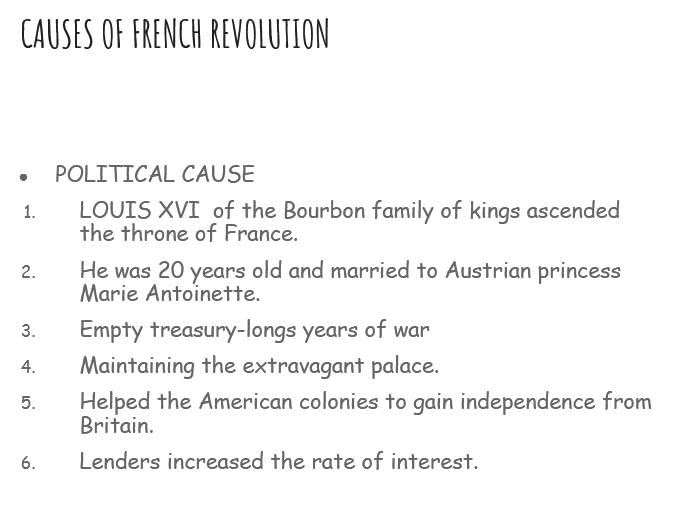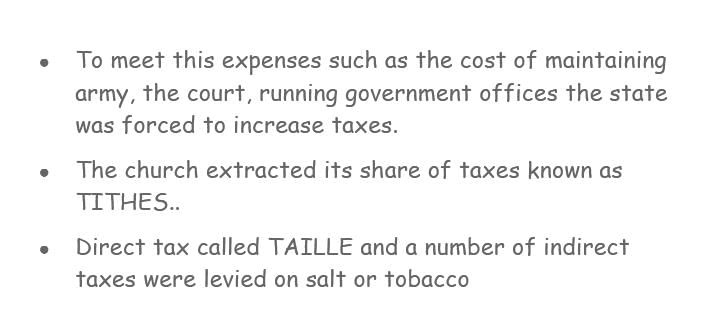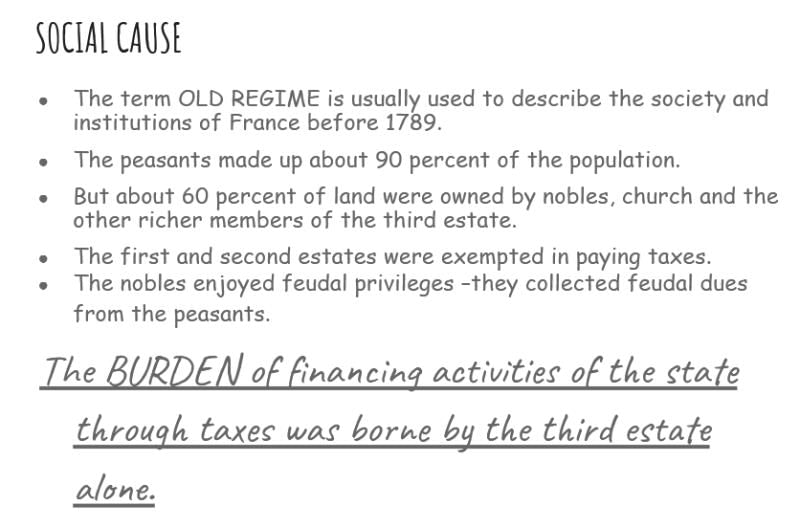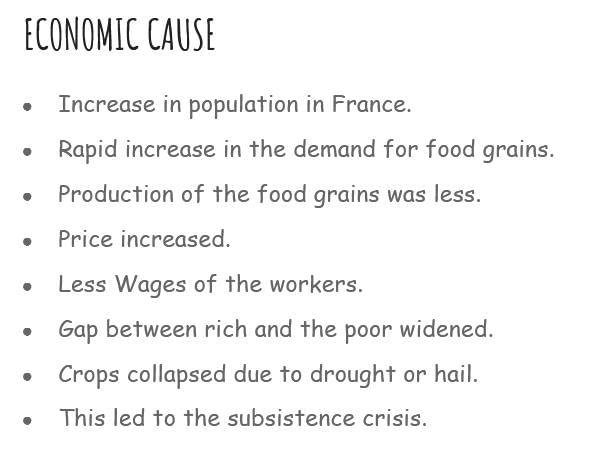Class 9 Exam > Class 9 Questions > What are the social , economic and political ...
Start Learning for Free
What are the social , economic and political causes of French Revolution?
Most Upvoted Answer
What are the social , economic and political causes of French Revoluti...
The French Revolution of 1789 was a major turning point in European history. It was a period of radical social and political upheaval that led to the collapse of the French monarchy and the rise of a democratic government. The causes of the French Revolution are complex and multifaceted, but can be broadly categorized into social, economic, and political factors.
Social Causes:
1. The French society was divided into three estates, with the clergy and nobility comprising the first two estates, and the common people forming the third estate. This social hierarchy created a sense of inequality and class division that was deeply resented by the third estate.
2. The third estate was also burdened with heavy taxes, while the first two estates enjoyed privileges and exemptions from taxation. This further exacerbated the sense of injustice and inequality.
3. The ideas of Enlightenment and the American Revolution also had a profound influence on the French society. The Enlightenment thinkers advocated for individual rights, liberty, and equality, which challenged the existing social order.
Economic Causes:
1. France was facing a severe financial crisis due to extravagant spending by the monarchy, expensive wars, and a stagnant economy. The government was heavily in debt and was forced to resort to borrowing and increasing taxes to meet its expenses.
2. The burden of taxes fell disproportionately on the third estate, which was already struggling to make ends meet. This led to widespread poverty and dissatisfaction among the common people.
3. The economic policies of the monarchy were also detrimental to the growth of the economy. The government imposed tariffs and restrictions on trade, which hindered the development of industries and commerce.
Political Causes:
1. The French monarchy was an absolute monarchy, with the king holding all the power and authority. This system of government was increasingly seen as outdated and oppressive by the people.
2. The government was also corrupt and inefficient, with officials appointed based on wealth and status rather than merit. This led to widespread dissatisfaction and a lack of trust in the government.
3. The lack of representation and participation in the government was another major political cause of the French Revolution. The third estate, which comprised the majority of the population, had no say in the government and no voice in decision-making.
Conclusion:
The French Revolution was a complex and multifaceted event that was caused by a combination of social, economic, and political factors. The deep-seated inequalities, financial crisis, and oppressive government policies led to widespread discontent, which eventually erupted into a full-scale revolution. The French Revolution had a profound impact on European history and paved the way for the rise of democratic governments and modern nation-states.
Social Causes:
1. The French society was divided into three estates, with the clergy and nobility comprising the first two estates, and the common people forming the third estate. This social hierarchy created a sense of inequality and class division that was deeply resented by the third estate.
2. The third estate was also burdened with heavy taxes, while the first two estates enjoyed privileges and exemptions from taxation. This further exacerbated the sense of injustice and inequality.
3. The ideas of Enlightenment and the American Revolution also had a profound influence on the French society. The Enlightenment thinkers advocated for individual rights, liberty, and equality, which challenged the existing social order.
Economic Causes:
1. France was facing a severe financial crisis due to extravagant spending by the monarchy, expensive wars, and a stagnant economy. The government was heavily in debt and was forced to resort to borrowing and increasing taxes to meet its expenses.
2. The burden of taxes fell disproportionately on the third estate, which was already struggling to make ends meet. This led to widespread poverty and dissatisfaction among the common people.
3. The economic policies of the monarchy were also detrimental to the growth of the economy. The government imposed tariffs and restrictions on trade, which hindered the development of industries and commerce.
Political Causes:
1. The French monarchy was an absolute monarchy, with the king holding all the power and authority. This system of government was increasingly seen as outdated and oppressive by the people.
2. The government was also corrupt and inefficient, with officials appointed based on wealth and status rather than merit. This led to widespread dissatisfaction and a lack of trust in the government.
3. The lack of representation and participation in the government was another major political cause of the French Revolution. The third estate, which comprised the majority of the population, had no say in the government and no voice in decision-making.
Conclusion:
The French Revolution was a complex and multifaceted event that was caused by a combination of social, economic, and political factors. The deep-seated inequalities, financial crisis, and oppressive government policies led to widespread discontent, which eventually erupted into a full-scale revolution. The French Revolution had a profound impact on European history and paved the way for the rise of democratic governments and modern nation-states.
Community Answer
What are the social , economic and political causes of French Revoluti...





|
Explore Courses for Class 9 exam
|

|
Question Description
What are the social , economic and political causes of French Revolution? for Class 9 2025 is part of Class 9 preparation. The Question and answers have been prepared according to the Class 9 exam syllabus. Information about What are the social , economic and political causes of French Revolution? covers all topics & solutions for Class 9 2025 Exam. Find important definitions, questions, meanings, examples, exercises and tests below for What are the social , economic and political causes of French Revolution?.
What are the social , economic and political causes of French Revolution? for Class 9 2025 is part of Class 9 preparation. The Question and answers have been prepared according to the Class 9 exam syllabus. Information about What are the social , economic and political causes of French Revolution? covers all topics & solutions for Class 9 2025 Exam. Find important definitions, questions, meanings, examples, exercises and tests below for What are the social , economic and political causes of French Revolution?.
Solutions for What are the social , economic and political causes of French Revolution? in English & in Hindi are available as part of our courses for Class 9.
Download more important topics, notes, lectures and mock test series for Class 9 Exam by signing up for free.
Here you can find the meaning of What are the social , economic and political causes of French Revolution? defined & explained in the simplest way possible. Besides giving the explanation of
What are the social , economic and political causes of French Revolution?, a detailed solution for What are the social , economic and political causes of French Revolution? has been provided alongside types of What are the social , economic and political causes of French Revolution? theory, EduRev gives you an
ample number of questions to practice What are the social , economic and political causes of French Revolution? tests, examples and also practice Class 9 tests.

|
Explore Courses for Class 9 exam
|

|
Signup for Free!
Signup to see your scores go up within 7 days! Learn & Practice with 1000+ FREE Notes, Videos & Tests.


















